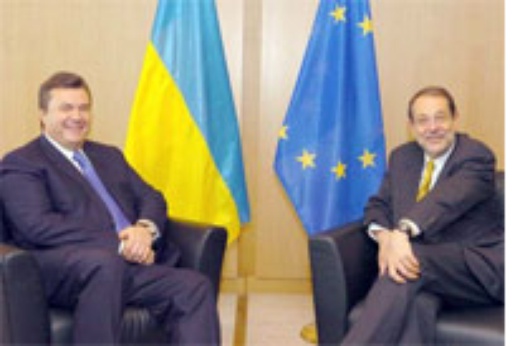An EU Foreign Minister: it’s not ‘Fantasy Politics’
Published on
Translation by:
 julia turney
julia turney
The Constitution would enshrine one, events demand one: in the future, European diplomacy will be co-ordinated by one person alone. Let’s take a closer look
 What would the founding fathers of Europe say today about the creation of a European Foreign Minister, as envisaged by the Constitutional Treaty? Would they be proud of our Constitution?
What would the founding fathers of Europe say today about the creation of a European Foreign Minister, as envisaged by the Constitutional Treaty? Would they be proud of our Constitution?
The idea of a common European foreign policy may seem to be a recent invention, but it was actually proposed more than fifty years ago in the form of the European Defence Community (EDC), a federal body that foresaw the creation of a European army. The EDC collapsed in 1954 due to the French Parliament’s failure to ratify the treaty, but its spirit has lived on. In the early 1990s, the geopolitical upsets following the collapse of communism and the first sparks of war in ex-Yugoslavia reignited belief in the need for a common European effort in foreign policy. As a result, the Common Foreign and Security Policy (CFSP) was created by the 1992 Maastricht Treaty and later underwent important modifications in the treaties of Amsterdam (1997) and Nice (2000). The Treaty of Nice was particularly important as it introduced the possibility for increased cooperation between EU member states in the field of common foreign and security policy, building on the creation (in 1999) of the position of High Representative for Foreign Policy and Security and various panels to support EU diplomatic activity.
The introduction of the Euro (which contributed to uniting European consciences), the terrorist threat hanging over Europe after the attacks of September 11th 2001 in the United States, and the Iraq crisis mean a re-evaluation of the CFSP is needed. Thus, the realisation of a truly coherent European foreign policy has become the main topic of debate throughout the Continent and beyond.
Who is the new Foreign Minister?
The polls confirm it: European citizens fully back the CFSP and hope for its ultimate development. But will the changes proposed by the European Constitution meet their expectations? The institution of a Minister for Foreign Affairs has become unanimously thought of as one of the major improvements which could be made to the current situation by the Constitution. Technically, the new position would be a fusion of the High Representative’s role in the CFSP and that of the External Relations Commissioner but the minister will also have new ‘powers’: for example the very important ‘right of initiative’, which previously lay in the hands of the Commission. He will also be a Vice-President of the Commission, which will increase his prestige. He will have essentially three responsibilities: to represent the EU over the question of common foreign policy and security, to conduct political discussions on behalf of the Union and express the European position in international organisations, as well as on occasions like international conferences. Therefore, at the request of European States which are not a part of the Union, he can be called to explain the position of the Union before the Security Council of the UN. A fundamental premise to developing his role is that the Union would effectively have a united position on a wide range of themes. But by whom is the CFSP decided? The Minister has, above all, a role of representation and co-ordination, but the decisions will continue to be made by the Council of Ministers, the body that represents the interests of each State. The criteria of unanimity will be upheld and EU member states will continue to command the right of veto; two large obstacles to the birth of a European policy.
The ambassadors of the EU?
But what effects will the reforms have regarding the CFSP in international relations? The creation of the post of Foreign Minister, much as it was loudly called for, for now remains a formal rather than a real revolution. But appointing a great personality as Minister could confer added importance to the role. The success of an office with such extensive visibility will, in the end, depend on the new Minister’s charisma and his ability to exploit the room which the new Constitution allows him. It will also be an opportunity to draw citizens closer to the Union’s politics and dispel the myth regarding the bureaucracy of Brussels. The Minister will be supported by a diplomatic service formed by delegates present in almost 125 countries: will they be our ambassadors of the future?
Translated from Ministro degli Esteri Ue: non è fantapolitica


